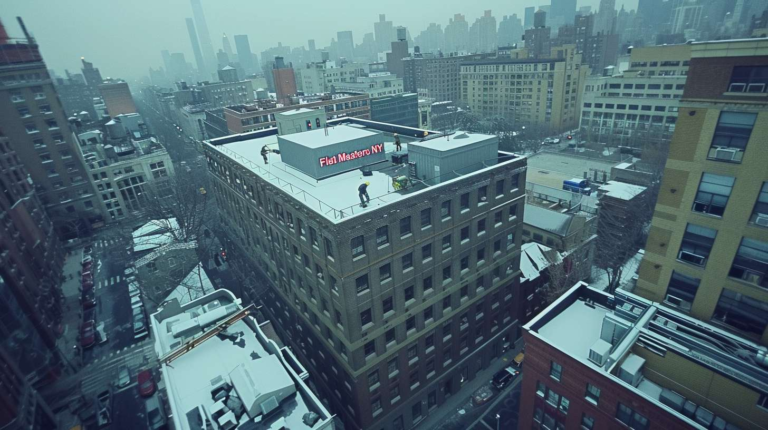What's the Average Flat Roof Lifespan Information You Need to Know?
The average lifespan of a flat roof typically ranges from 10 to 30 years depending on the material and installation quality. Here in Queens, I've seen EPDM rubber roofs last 15-20 years, TPO membranes go 20-25 years, and modified bitumen systems push 15-20 years when properly maintained.
Look, I've been installing flat roofs across Queens for over two decades now, and the flat roof lifespan information most homeowners get is either overly optimistic or completely wrong. Last month alone, I replaced three roofs in Astoria that were supposed to last 25 years but failed at 12 because of poor installation and zero maintenance.
What Affects Your Flat Roof Life Span?
The life span of a flat roof isn't just about the material you choose - though that's obviously important. Weather here in Queens is brutal on flat roofs. We get everything from scorching summers that can hit 90+ degrees on the roof surface to freezing winters with ice dams, plus all that salt air from the East River and Long Island Sound.
Material quality makes the biggest difference. A cheap TPO membrane might cost you $4-6 per square foot, but it'll start cracking in 8-10 years. Premium EPDM with proper reinforcement runs $8-12 per square foot but gives you that full 20-year lifespan.
Installation matters just as much. I can't tell you how many times I've seen perfectly good roofing materials fail early because some contractor cut corners on the deck prep or didn't properly seal the seams. My crew always does a complete deck inspection first - if there's any rot or structural issues, we fix those before installing the new membrane.
Flat Roof Material Lifespans in Queens
- EPDM Rubber: 15-20 years with proper maintenance
- TPO (Thermoplastic): 20-25 years, but heat welded seams are crucial
- Modified Bitumen: 15-20 years, excellent for our climate
- Built-up Roofing (BUR): 20-30 years but requires more maintenance
- PVC Membranes: 20-30 years but cost significantly more upfront
Here's something most contractors won't tell you - the average lifespan of flat roof systems in Queens is actually shorter than the manufacturer warranties suggest because of our unique weather patterns. We get rapid freeze-thaw cycles that stress membrane joints, plus heavy snow loads that can cause ponding water issues.
Signs Your Flat Roof Is Approaching End of Life
You don't wake up one morning and find your roof completely failed. The life span of flat roof systems shows warning signs years before total replacement becomes necessary.
Membrane cracking is usually the first sign I look for during inspections. Small cracks around penetrations or along seams indicate the material is losing its flexibility. On a modified bitumen roof I inspected last week in Elmhurst, the homeowner could have extended the roof life by 3-4 years with targeted repairs, but they waited too long.
Ponding water is another major indicator. If water sits on your roof for more than 48 hours after rain, you've got drainage problems that will significantly shorten your flat roof lifespan. Sometimes it's just clogged drains, but often it means the roof deck has settled or wasn't properly sloped during installation.
Granule loss on modified bitumen systems tells you the protective layer is wearing away. Once you start seeing the base mat showing through, you've got maybe 2-3 years before leaks start.
Maintenance That Actually Extends Flat Roof Life Span
Most homeowners think flat roof maintenance means just cleaning gutters twice a year. That's barely scratching the surface of what these systems need to reach their full lifespan potential.
Drain maintenance is critical here in Queens because we get those sudden downpours that can dump 2-3 inches in an hour. I recommend checking drains monthly during spring and fall, weekly during heavy leaf season. A $20 drain cleaning can prevent thousands in water damage.
Seam inspection should happen twice yearly. Look for any separation along membrane joints, especially after severe weather. Small seam failures can be repaired for $200-300, but if you let them go, you're looking at membrane replacement in that section.
Professional inspections every 3-5 years catch problems before they become expensive. My standard inspection runs $150-200 and includes a detailed report with photos of any issues. I've seen too many flat roofs fail prematurely because small problems weren't addressed early.
Climate Impact on Flat Roof Lifespan Information
Queens weather is particularly hard on flat roofing systems. The combination of hot summers, cold winters, and our proximity to salt water creates unique challenges that affect the average lifespan of a flat roof.
UV exposure from those brutal summer days breaks down roofing materials faster than in cooler climates. Dark-colored membranes can reach 160-180 degrees on the surface during July heat waves. That constant expansion and contraction stresses seams and accelerates aging.
Winter freeze-thaw cycles are just as damaging. Water that gets into tiny cracks expands when it freezes, making those cracks bigger. Over 15-20 freeze-thaw cycles per winter, even small imperfections become major problems.
Salt air from the waterfront areas affects metal components like flashing, fasteners, and HVAC penetrations. I always use stainless steel or specially coated materials in areas within two miles of the water.
Cost vs. Lifespan: Making Smart Decisions
Here's where most property owners make expensive mistakes - they focus on upfront cost instead of cost per year over the flat roof life span. A $8,000 EPDM system that lasts 18 years costs $444 per year. A $12,000 PVC system that lasts 25 years costs $480 per year. Not much difference when you look at it properly.
But there's more to consider than just material costs. Installation quality affects lifespan more than most people realize. We charge 15-20% more than the lowest bidders because we take time to properly prepare substrates, use premium adhesives, and detail penetrations correctly. That extra cost typically extends roof life by 30-40%.
Warranty coverage varies dramatically between materials and installers. Manufacturer material warranties are usually 15-20 years, but workmanship warranties range from 1-10 years. We provide 10-year workmanship warranties because we're confident in our installation quality.
When to Replace vs. Repair
The decision between repair and replacement depends on several factors beyond just age. I use the 50% rule - if repairs would cost more than half of replacement cost, it's time for a new roof.
A roof that's reached 75% of its expected lifespan usually makes more sense to replace than repair. For example, if you have a 15-year-old EPDM system with multiple small leaks, patching might buy you 2-3 more years, but replacement gives you another full lifespan.
Extensive ponding water problems often require replacement because the underlying structure needs correction. You can't fix structural settling with membrane repairs.
Energy efficiency considerations also factor into replacement decisions. Newer roofing systems with proper insulation can reduce heating and cooling costs by 15-25%. Over a 20-year lifespan, those savings often offset a significant portion of replacement costs.
Flat Masters NY's Approach to Maximizing Roof Life
We've developed installation and maintenance practices specifically for Queens conditions that consistently extend flat roof lifespans beyond manufacturer expectations. Our systematic approach starts with thorough substrate evaluation and continues through post-installation maintenance programs.
Proper drainage design is crucial in our area because of sudden heavy rainfall. We always verify positive drainage to all outlets and install additional drains when needed. Ponding water is the fastest way to shorten any flat roof's lifespan.
Our maintenance programs include spring and fall inspections, drain cleaning, minor repairs, and detailed documentation. Properties on our maintenance program average 20-25% longer roof life than those without regular professional attention.
When you're ready to discuss your flat roof replacement or want a professional assessment of your current system's remaining life, give us a call at (917) 994-7618. We'll provide honest flat roof lifespan information based on your specific situation and help you make the most cost-effective decision for your property.


